Friday, 18 June 2010
Distance 39 km
Duration 7 hours 25 minutes
Ascent 538 m, descent 517 m
Map 56 of the TOP 100 blue series (or Maps 160 and 159 in the new lime-green series)
Topoguide (ref. 6542) Sentier vers Saint-Jacques-de-Compostelle via Vézelay
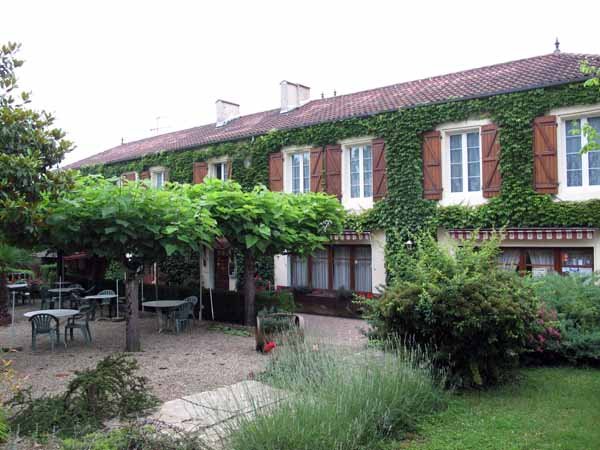
In view of the doubtful weather, we had decided to start the day well by having a proper breakfast before setting off. Yesterday’s hotel breakfast had kept us going beautifully until the first coffee stop, and at this establishment it was served from 7:30 am, not too late.
All packed and in our walking clothes, including my newly glued shoes, we were waiting outside the dining room at 7:29, but it remained locked and dark until madame stumbled down the stairs just before 8, apologising for having slept in. In the end we only had the express breakfast for €3.50 each – coffee and a croissant – and hurried off.
We probably need not have bothered staying for breakfast at all, because very soon we arrived at the twin town of Barbaste, where there was a boulangerie and bar on the first corner. Naturally we sat down and repeated the whole performance.
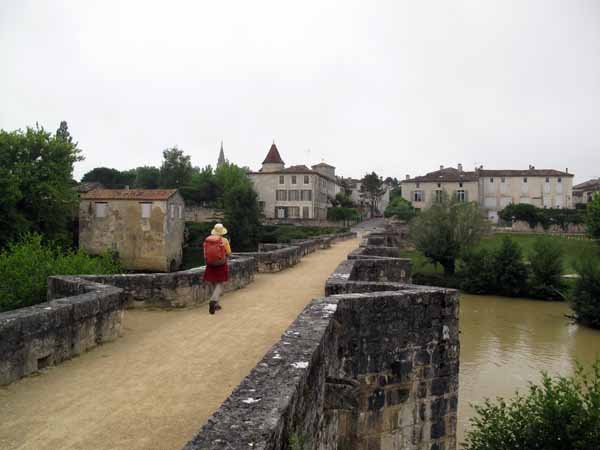
To get to Barbaste, we crossed a tributary of the Baïse (the Gélise), over an ancient low-level foot bridge, which was unusual in having “beaks” on both sides.
These pointed masonry piers were used to deflect the force of the water and were normally only on the upstream side of a bridge. Perhaps the Gélise was swamped by back-wash from the Baïse during floods.
Next to the bridge was a magnificent but oddly lop-sided mill building, like a small fortified château with four towers, each one a different height and thickness.
According to legend, they represented the miller’s four daughters, some of whom were evidently bigger and burlier than others.
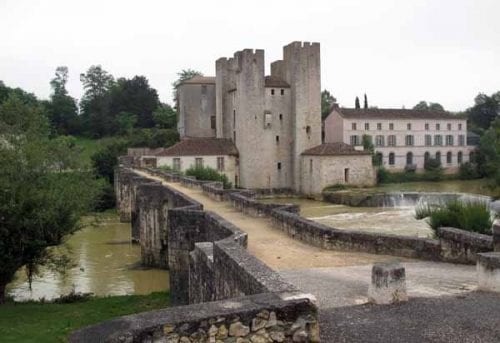
To continue our journey we had to return over the footbridge, and by that time it was raining. We followed the GR up a small road to the D408 and stayed on the bitumen when the GR turned off soon after. The track looked like a trench on the Somme.
Our road was quiet and we could see the Gélise across the fields. In former times there were over 200 flour mills in this wide river valley, such was the amount of wheat being grown.
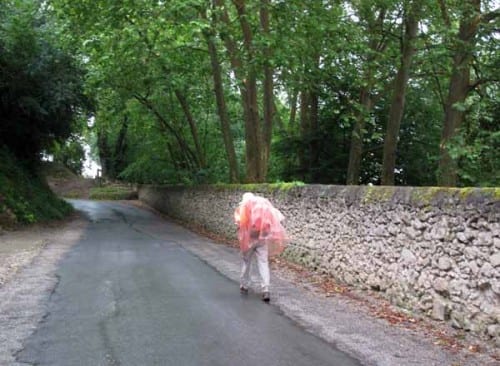
One of the few remnants of this industry was the fortified farm of Cauderoue, which we saw in the distance.
Beyond the farm rose a dense forest – the edge of what used to be a the treeless area of the Landes, but is now one enormous forestry project.
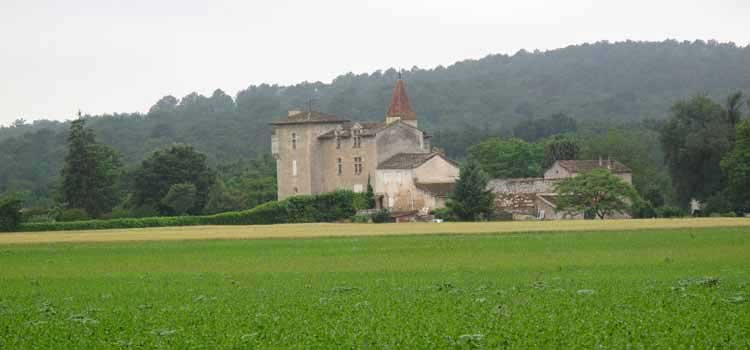
After four or five kilometres, we joined a bigger road, the relentlessly climbing D656, and continued for another couple of hours in a dead straight line.
Our legs were working away in top gear but our minds were in neutral, ranging over all sorts of things and hardly aware of being in motion. It was not the most interesting of walks, but much shorter than the skittish GR.
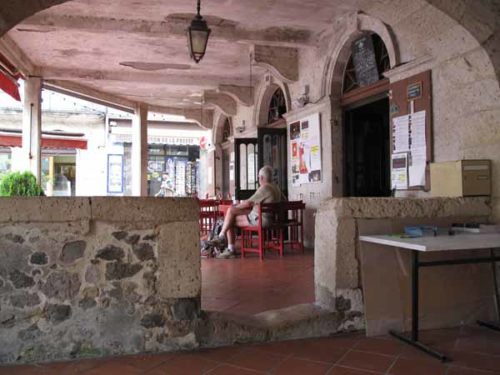
A kilometre or so before Mézin we finally turned off onto a crooked farm road that took us down over a stream and then up to the top of the village.
There were no shops to be seen, but we asked a man and he directed us down to the centre, which was a delightful surprise.
It was a typical bastide square, with deep arcades under which were various shops and bars. One side was taken up by a fortified church covered in scaffolding. We lost no time settling down at the first bar for a much-anticipated coffee.
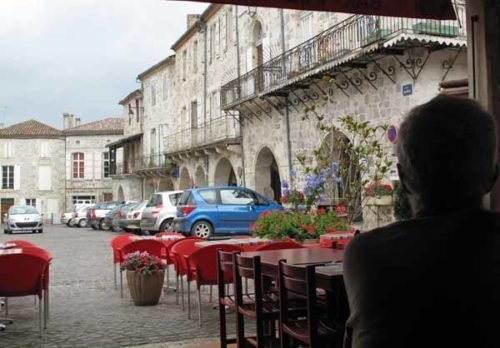
The nearby step in the pavement had been impressively worn down and polished by seven centuries of passing feet.
While we were drinking we fell into conversation with a Parisian couple, formerly from this area, who said that their psychologist daughter had gone to Australia in search of a job, but had not been able to find one. We felt quite responsible for her misfortune.
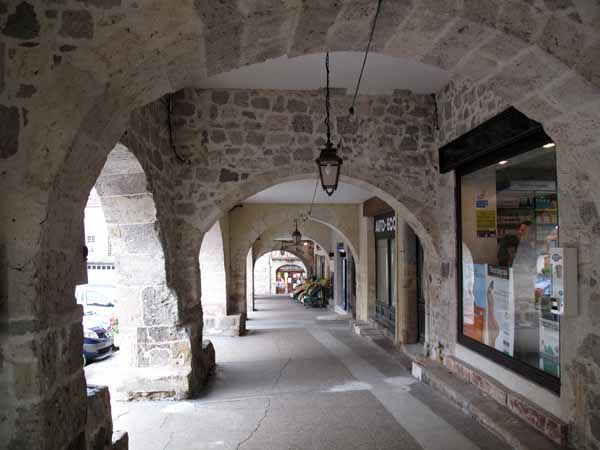
The woman then insisted that we visit the château of Bonaguil near Fumel – only 40 kilometres away! We felt that she did not quite have a grip on the concept of walking.
As we were now on our new map (TOP 100 number 159), we laid it out, together with the Topoguide, to consider our next move. We had thought of staying at Mézin for the night but it was only midday and not hot, so it seemed a better idea to press on.
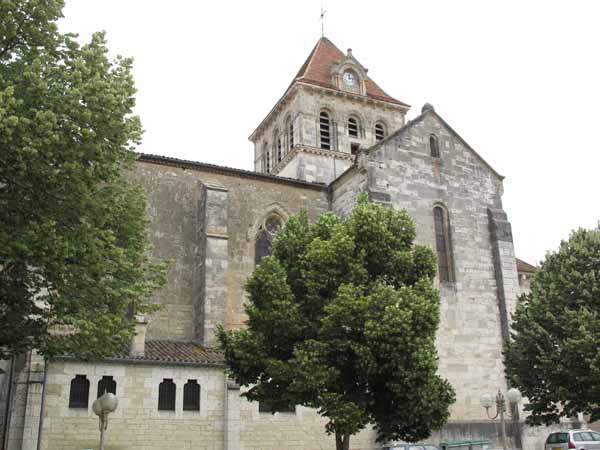
The GR continued towards Montréal-du Gers but our destination was Condom, further to the east. The distance on the main road was 14 km and we could see a minor road on the map that would take us there almost as directly.
Getting to Condom today had a particular advantage: we had decided that we had time to get to Auch, which was a two-day walk, but we would have to stay at Castéra-Verduzan on the way, a place that we knew very little about.
By saving a day now, we could arrive in Castéra-Verduzan on Saturday instead of on Sunday. Sunday was always a difficult night to get a meal in a small town.
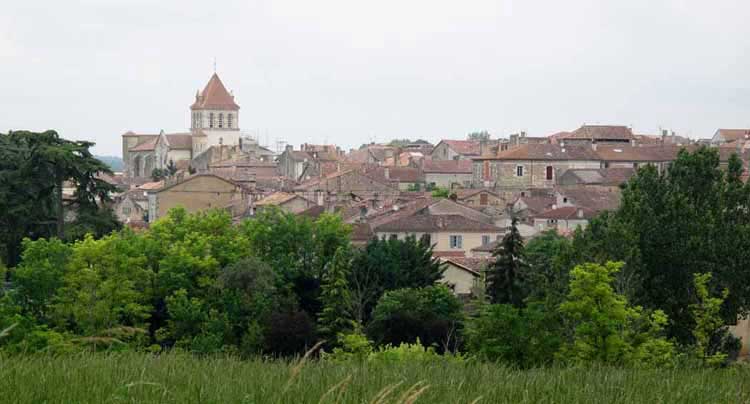
We left the village through a spider’s web of descending lanes which delivered us to the bypass road, from which our chosen road went off in a south-easterly direction.
It was a pleasant change from the relentlessly straight highway that we had endured before Mézin, dipping and curving through rich fields of grain, with a fine view back to the village.
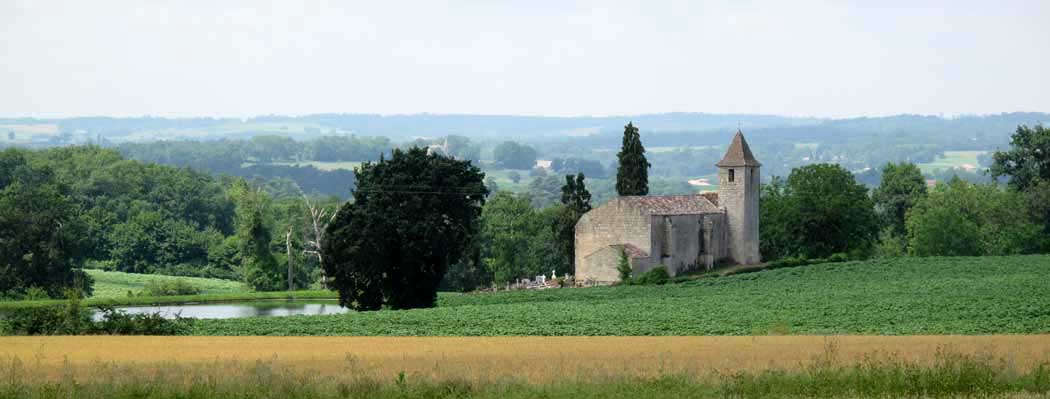
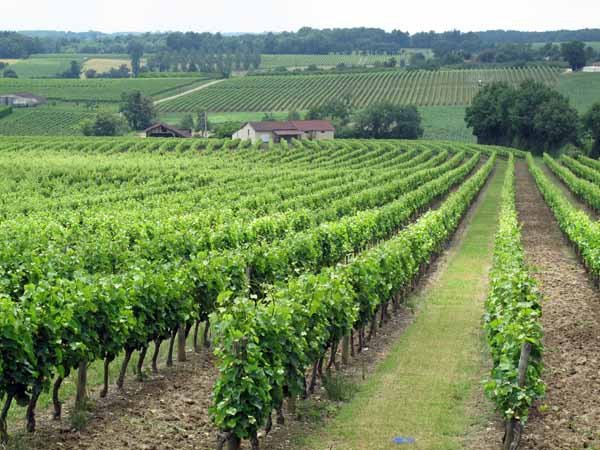
Hardly a car came past and there was only the occasional farmhouse. We passed the thirteenth-century chapel of Fousserie, all alone in the landscape with its little pond. It was not always so isolated – the château to which it was attached has now completely disappeared.
The story is that the seigneur of Fousserie came back from the crusades so badly crippled that he could not travel the short distance to the nearest church, so he had this chapel built instead.
A couple of kilometres further on we crossed the departmental border between the Lot-et-Garonne and the Gers, and at the same time left the region of Aquitaine and entered Midi-Pyrénées. Soon afterwards we arrived at a crossroads and to our horror there was a sign – “Condom 11 km”.
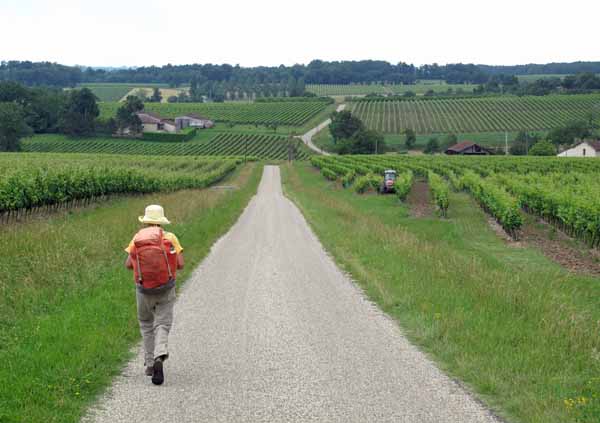
We had been walking for over an hour and a half and were only three kilometres closer to Condom than the total distance on the highway. We had just re-learned the lesson that maps cannot show all the twists and turns in the smaller roads, and therefore judging their distance by eye is impossible.
To recover our spirits, we sat down beside the road and had lunch. When we set off again we were suddenly among vines instead of wheat. The whole valley was clad in them and tractors were at work in the rows.
These grapes were destined, not for wine, but for Armagnac, the oldest and most revered brandy in France. Unlike its rival Cognac, Armagnac is distilled only once and is then stored in wooden barrels, which impart a complex flavour and a dark colour.

According to a fourteenth-century writer, it has wonderful virtues:
“It makes disappear redness and burning of the eyes, and stops them from tearing; it cures hepatitis, sober consumption adhering. It cures gout, cankers, and fistula by ingestion; restores the paralysed member by massage; and heals wounds of the skin by application.
It enlivens the spirit, partaken in moderation, recalls the past to memory, renders men joyous, preserves youth and retards senility. And when retained in the mouth, it loosens the tongue and emboldens the wit, if someone timid from time to time himself permits.”
We had tasted this miraculous liquor on an earlier walk in the area, and were to do so again before long.
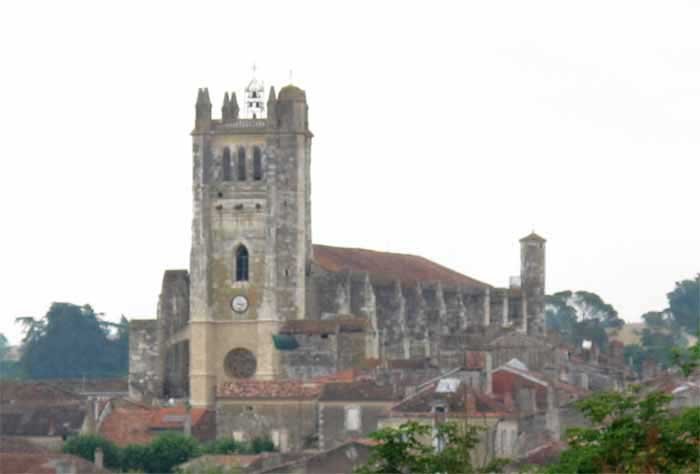
We had not gone far when it began to rain in earnest, and as were were getting into our capes, a car pulled up and the driver shouted “I’ve just come along at the right moment – get in!”
I felt very priggish and ungrateful when I replied that it was necessary to walk, but he was probably used to the ways of pilgrims, as we were now close to the main pilgrim route from le Puy.
The rain continued until we were within sight of Condom, then stopped in time for us to decide to risk camping.
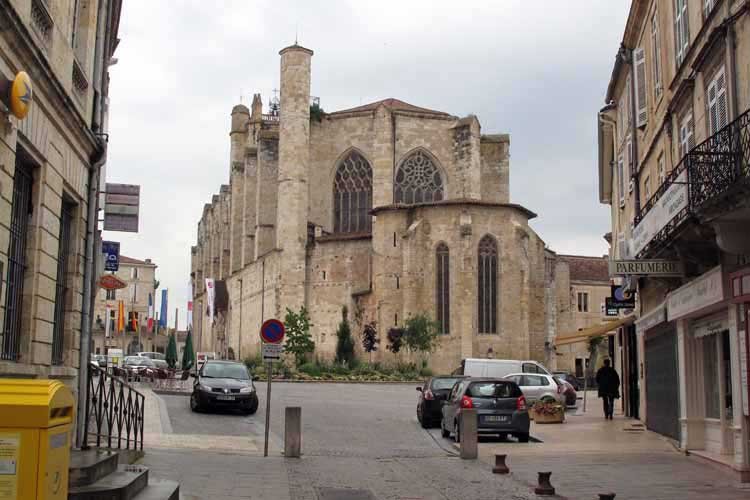
We had camped here on our previous visit in 2003, and we recognised the bridge and the gravel path along the levée bank that led to the camping.
But before going there we crossed the river (still the Baïse) and marched up through scruffy lanes to the main square, which was huge, but not huge enough for the cathedral at its centre.
The Café des Sports of happy memory was still going and, as it seemed a bit early in the day for Armagnac, we treated ourselves to a glass of rosé each.
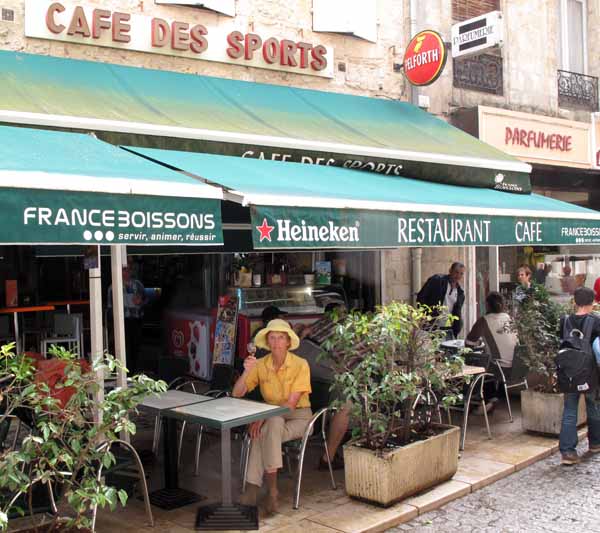
When Keith went to pay he was charged €8, so I went up to the little half-bald manager and politely complained. He was horrified and handed over a €5 note with profuse apologies.
We then hunted about until we found the Office of Tourism, down near the river on the main road (the D930), and got the reassuring news that there was both a camping ground and a hotel at Castéra-Verduzan.
From there we took the low road back to the bridge where we had come in, crossed it and continued to the camping ground, which was about a kilometre along the river.
Entering by the small gate on the path, we presented ourselves at the office and were instructed to pitch our tent at the far corner of the grounds, as we did not need electricity, but we ignored that and set ourselves up close to the shower block. There were plenty of empty places.
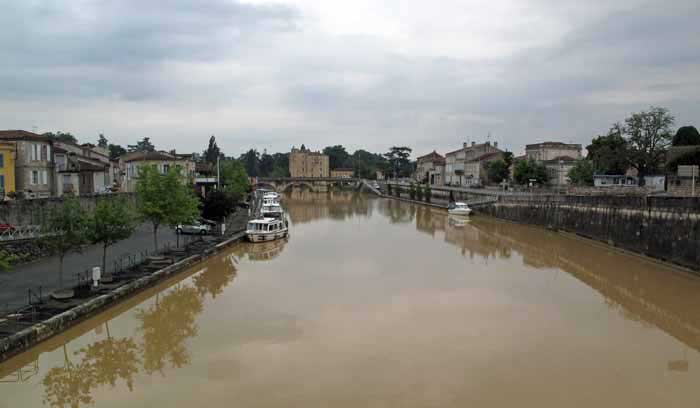
Keith had a shower which was barely distinguishable from cold, so I decided not to bother. It was too late, too cloudy, too chilly, and I had had enough exposure to water for the day.
Our shoes were saturated and mine had come adrift as usual.
Later we went back unencumbered to town, wearing sandals, socks, long pants and warm jackets. We walked to and fro in the eating area and ended up back at the Café des Sports, where the little man welcomed us warmly.
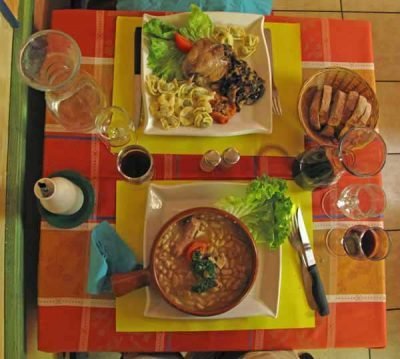
There was quite a crowd inside, although none of them looked like pilgrims (who were probably eating hard tack at the gîte).
We ordered one menu du pèlerin plus an extra main course. The entrée was an Italian salad, large and nourishing, with a pile of cooked vegetables and olives on top. Then I had a magret de canard and Keith had cassoulet (the extra dish).
The dessert was apple tart, which Keith manfully consumed on his own. It was a lovely meal and we did not even get wet on the long walk home.
Previous day: Aiguillon to Lavardac